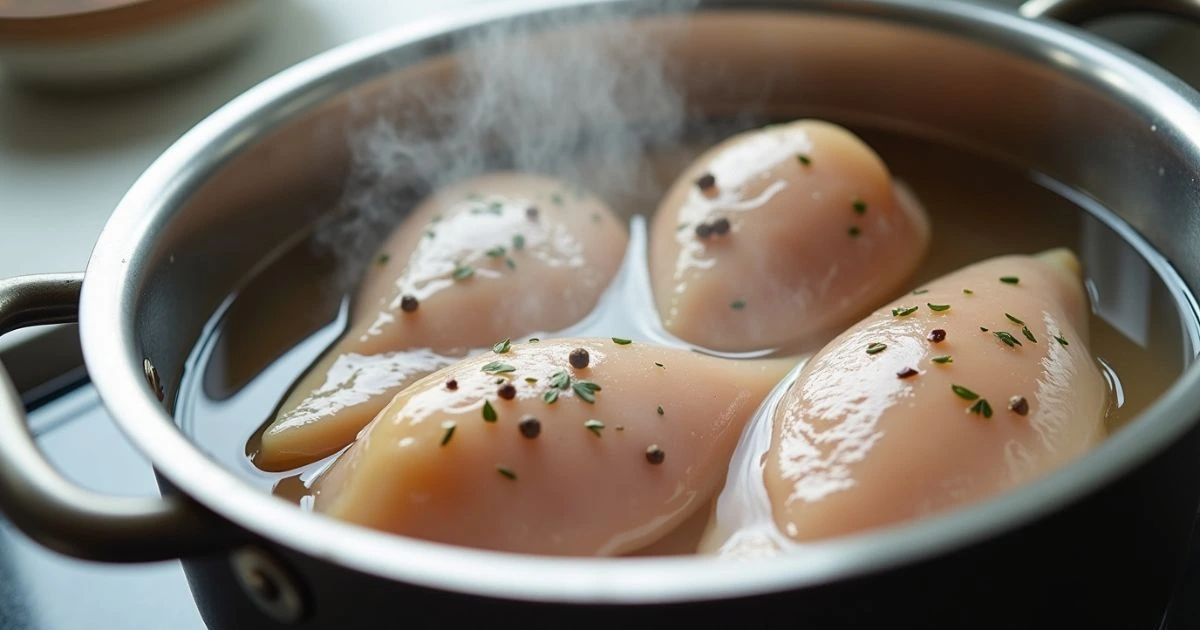Cooking chicken breast can be tough for many home cooks. To get tender boiled chicken, you need to know the right techniques. This guide will show you how to cook chicken perfectly every time.
Boiling is a great way to keep chicken moist and prevent it from drying out. Many people struggle to keep chicken juicy. But with the right method, you can make a simple chicken breast into a tasty base for many dishes.
Professional chefs stress the importance of technique when cooking chicken. It’s all about controlling temperature, timing, and the liquid you use. You’ll learn tips that make a big difference, turning a tough piece of meat into a juicy, flavorful chicken breast.
This detailed guide will take you through boiling chicken breast step by step. You’ll learn how to pick the best cut and understand the exact cooking times. Soon, you’ll be able to make chicken as good as a restaurant’s in your own kitchen.
Table of Contents
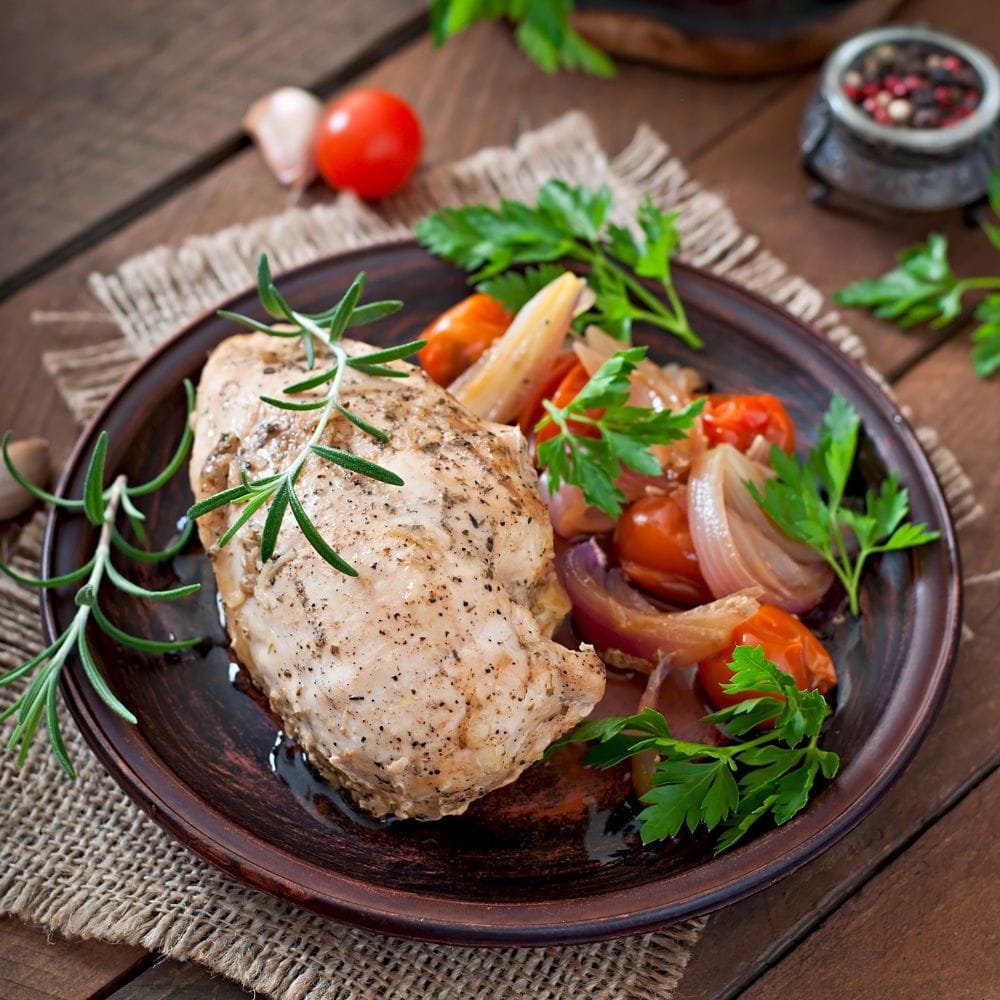
How Long to Boil Chicken Breast (Juicy & Tender Every Time)
Ingredients
Equipment
Method
- Thaw chicken in the refrigerator for 24 hours if frozen. Trim excess fat and pound to even thickness for uniform cooking.
- Fill a large pot with enough water or broth to submerge the chicken. Add seasonings, herbs, and vegetables for flavor.
- Bring liquid to a boil, then immediately reduce heat to a gentle simmer. Add the chicken breasts.
- Boneless chicken breasts: simmer 12–15 minutes.
- Bone-in chicken breasts: simmer 25–30 minutes.
- Frozen breasts: increase time by 50%.
- Use a meat thermometer to confirm the internal temperature reaches 165°F (74°C).
- Remove from the pot, cover loosely with foil, and rest for 3–5 minutes to allow juices to redistribute.
- Slice, shred, or dice as desired. Use in salads, soups, wraps, or casseroles. Store leftovers in an airtight container in the fridge for up to 4 days or freeze for up to 3 months.
Notes
- Always use a gentle simmer, not a full boil, to keep chicken moist.
- Brining chicken before boiling adds flavor and tenderness.
- Check temperature with a meat thermometer, 165°F (74°C) is the safe internal temperature.
- Resting helps juices redistribute for better texture.
- Use leftover broth as a flavorful base for soups or sauces.
Understanding the Basics of Boiling Chicken Breast
Cooking chicken breast in water is a healthy and versatile method. It makes your meal prep easier. Boiling is a simple way to cook chicken that stays tender and juicy.
Boiling has many benefits for home cooks. It cooks chicken quickly and safely. It also keeps the chicken moist and prevents it from getting overcooked.
Benefits of Boiling Over Other Cooking Methods
- Preserves chicken’s natural moisture
- Reduces risk of burning or charring
- Creates a versatile protein for multiple dishes
- Allows for easy seasoning and flavor absorption
Essential Equipment Needed
To boil chicken breast well, you need a few tools:
- Large pot with lid
- Meat thermometer
- Slotted spoon
- Sharp kitchen knife
Types of Chicken Cuts for Boiling
Not all chicken cuts are the same for boiling. Skinless, boneless chicken breast halves boil for 12 to 15 minutes. Bone-in breasts make a rich broth while cooking.
Pro tip: Choose fresh, high-quality chicken for the best results in your boiling technique.
How Long to Boil Chicken Breast
Knowing how long to boil chicken breast is key for tasty and safe chicken. The time needed depends on the chicken cut and if it’s fresh or frozen.
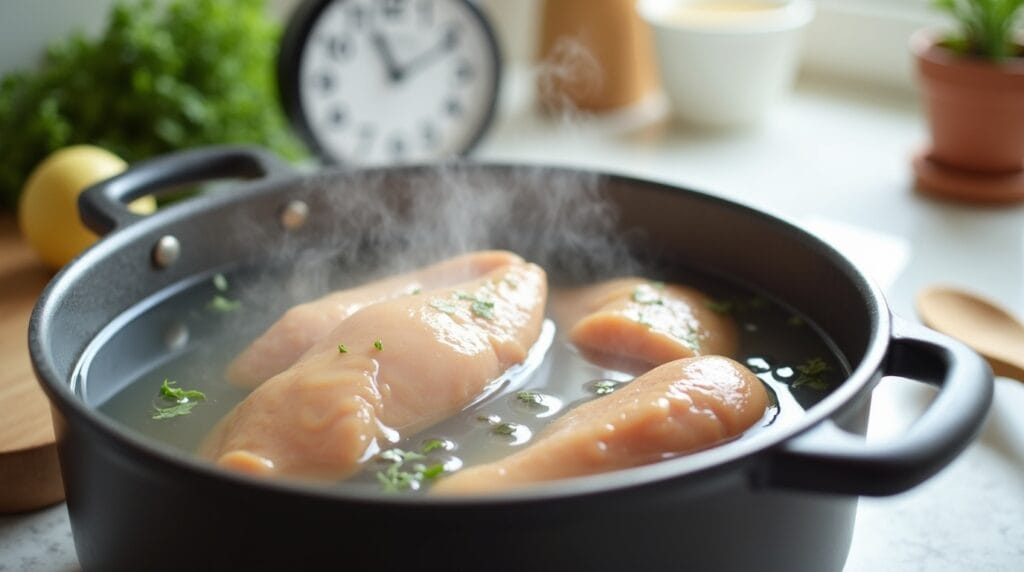
When figuring out how long to boil chicken, it’s important to know the different times for each cut. Each chicken breast needs special care to cook right.
Boneless Skinless Breast Timing
Boneless skinless chicken breasts boil best in 12 to 15 minutes. Here’s a quick guide:
- Thin chicken breasts: 12 minutes
- Standard-sized breasts: 13-15 minutes
- Thick chicken breasts: Up to 15 minutes
Bone-in Breast Timing
Bone-in chicken breasts need more time because they’re denser. Usually, it takes about 25-30 minutes to boil them fully.
Frozen Chicken Boiling Times
Boiling frozen chicken takes longer and needs extra care. The right time for frozen chicken is about 50% longer than fresh:
- Frozen boneless breasts: 18-22 minutes
- Frozen bone-in breasts: 35-45 minutes
Pro Tip: Always use a meat thermometer to ensure your chicken reaches an internal temperature of 165°F (74°C) for safe consumption.
Remember, cooking times can change based on chicken size and thickness. The best way to know if it’s cooked right is to check the internal temperature.
Preparing Your Chicken for Boiling
Preparing chicken breast for boiling is key to great results. The right steps can make your chicken taste better and feel softer.
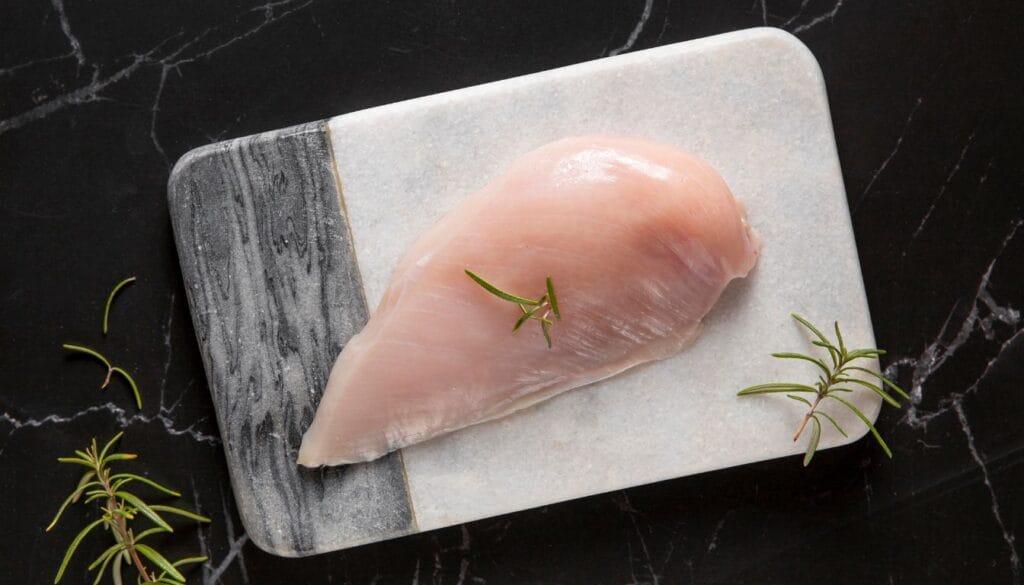
- Thaw frozen chicken safely in the refrigerator
- Remove excess fat and unwanted skin
- Consider pounding chicken to create uniform thickness
- Optional: Brine the chicken for enhanced flavor
Thawing chicken is essential. Don’t thaw it at room temperature, as it can grow bacteria. Instead, thaw it in the fridge for at least 24 hours before cooking. This slow thawing keeps the chicken safe and evenly defrosted.
| Preparation Step | Time Required | Purpose |
| Refrigerator Thawing | 24 hours | Safe, even defrosting |
| Fat Trimming | 5-10 minutes | Improve chicken texture |
| Pounding | 3-5 minutes | Ensure uniform cooking |
For even cooking, make sure the chicken is the same thickness. Gently pound the chicken between plastic wrap to create an even surface. Use a meat mallet or rolling pin for this.
Pro tip: Brining your chicken before boiling can significantly improve moisture and flavor retention.
By following these steps, you’ll get perfectly boiled chicken every time.
Choosing the Right Cooking Liquid
Choosing the perfect liquid for your juicy boiled chicken can make a big difference. The right liquid not only cooks your chicken but also adds flavor. This makes your dish tender and delicious.
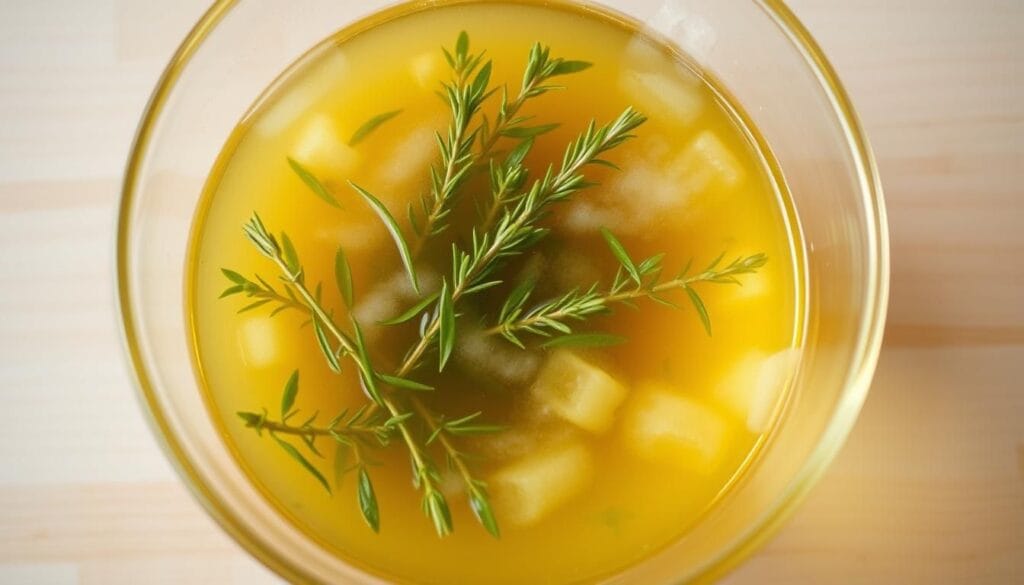
Start by understanding the different liquids you can use. Water is simple but great for letting other flavors stand out.
Water vs. Broth: Flavor Foundations
When cooking chicken, you have several liquid options:
- Plain water for a neutral taste
- Chicken broth for a rich, savory flavor
- Vegetable broth for extra complexity
- Combination liquids for a unique taste
Elevating Flavor with Aromatics
Add aromatic ingredients to your liquid for better chicken flavor. Herbs, spices, and vegetables add amazing layers of taste.
“The secret to delicious poached chicken lies in the liquid you choose.” – Professional Chef
Exploring Alternative Liquids
Try unique liquids like:
- Apple cider for a sweet touch
- Coconut milk for a creamy, international flavor
The liquid you pick is key to your juicy boiled chicken. Each liquid adds its own special touch, letting you customize your chicken’s taste.
Perfect Temperature Control Techniques
Getting the best temperature for boiling chicken is key to tender, juicy results. When boiling chicken breast, aim for a gentle simmer, not a fast boil. High heat can make the protein tighten and become tough, ruining the meat’s texture.
To control the temperature well when boiling chicken breast, follow these steps:
- Start with water at a rolling boil, then immediately reduce heat
- Maintain a low, steady simmer around 165°F (74°C)
- Use a reliable meat thermometer to monitor internal temperature
- Adjust stovetop heat to prevent aggressive boiling
The right cooking time for boiling chicken breast depends on a few things. Boneless chicken breasts usually need 12-15 minutes of gentle simmering. Bone-in cuts might take 20-25 minutes.
| Chicken Type | Simmer Temperature | Cooking Time |
| Boneless Chicken Breast | 165°F (74°C) | 12-15 minutes |
| Bone-in Chicken Breast | 165°F (74°C) | 20-25 minutes |
Your cooking altitude can affect boiling temperatures. At higher elevations, water boils at lower temperatures. You might need to adjust cooking times slightly. Always make sure your chicken reaches a safe internal temperature of 165°F (74°C) to avoid foodborne illness.
Essential Seasoning Guidelines for Boiled Chicken
Turning a simple boiled chicken recipe into a flavorful dish starts with the right seasoning. Learning how to season chicken during boiling is key. The right mix of seasonings can turn your chicken into a delicious meal.
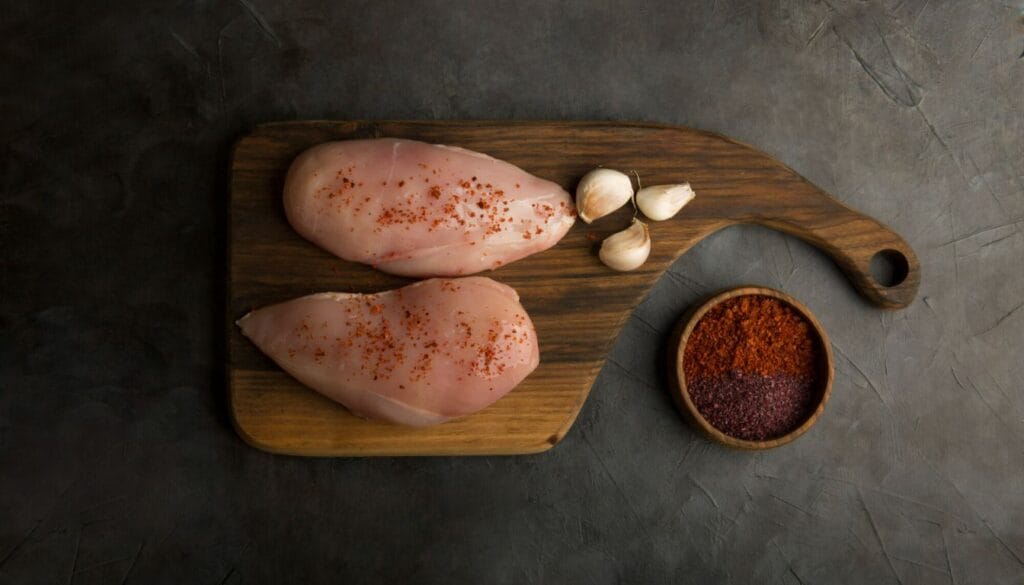
How you season your chicken greatly affects its taste. Professional chefs start by seasoning the cooking liquid. This is where flavor layering begins.
Basic Seasoning Combinations
Here are some basic seasoning tips for your boiled chicken:
- Salt and black pepper for classic flavor
- Garlic powder and dried herbs
- Paprika and onion powder blend
- Lemon zest with fresh thyme
Herb and Spice Pairings
Try these herb combinations to spice up your chicken:
- Mediterranean Style: Rosemary, oregano, and basil
- Cajun Twist: Cayenne, paprika, and dried parsley
- Asian Inspiration: Ginger, garlic, and green onions
- Herb Garden: Fresh dill, chives, and tarragon
Pro tip: Add onion wedges, carrot pieces, or garlic cloves to your boiling liquid. This creates richer, more complex flavors.
Signs of Properly Cooked Chicken
Learning how long to boil chicken is key. You need to know when it’s perfectly cooked. The best way is to check its internal temperature.
For juicy boiled chicken, look for these signs:
- Internal temperature of 165°F at the thickest part
- Clear, not pink juices when pierced
- Firm, white meat with no translucent areas
- Meat that pulls apart easily
A meat thermometer is your best friend. Stick it into the thickest part of the breast. When it hits 165°F, your chicken is ready.
Pro tip: Let the chicken rest for 3-5 minutes after cooking. This helps juices spread, making it tender.
While visual signs are useful, they’re not always right. Pink meat doesn’t always mean it’s not done. And white meat doesn’t always mean it’s safe. Always check the temperature first.
Don’t cut into the chicken right after cooking. It loses moisture. Use a meat thermometer to check the temperature without losing juiciness.
Resting and Serving Your Boiled Chicken
After you’ve boiled your chicken to perfection, the last steps are key. Resting your chicken right can turn a tough meal into a juicy, tasty dish.
Why Resting Matters
Resting your boiled chicken is a step many miss. It lets the meat’s temperature rise a bit more. This helps the juices spread evenly throughout the chicken.
Proper Resting Technique
- Remove chicken from boiling liquid
- Place on a clean cutting board
- Cover loosely with aluminum foil
- Let rest for 3-5 minutes
Serving Suggestions
Your boiled chicken can be enjoyed in many ways. Here are some tasty ideas:
- Slice and serve over fresh salad
- Shred for sandwiches or wraps
- Dice for chicken salad
- Pair with roasted vegetables
Pro tip: Always use a meat thermometer to ensure your chicken reaches 165°F internally for food safety.
By following these tips, your boiled chicken will become a delicious, healthy meal. It’s sure to please everyone at the table.
Storage and Make-Ahead Tips
Learning to boil chicken means knowing how to store it safely and well. Cooking chicken in water makes it a great base for many meals. You can prepare it ahead and store it easily.
Here are key steps for storing boiled chicken:
- Cool the chicken completely at room temperature (within 2 hours)
- Use airtight containers or sealed plastic bags for storage
- Refrigerate boiled chicken for up to 3-4 days
- Freeze boiled chicken for maximum 2-3 months
It’s important to cool the chicken right after boiling. Lay the pieces on a clean cutting board. Let them cool down before putting them in the fridge. This stops moisture and bacteria from growing.
Boiled chicken is perfect for meal prep. You can shred, slice, or cube it. Store it in small containers for quick dinners.
Pro tip: Label your storage containers with the date of cooking to track freshness accurately.
When you reheat boiled chicken, make sure it’s hot enough. The temperature should be 165°F. Use gentle heat, like microwaving with broth or warming in a skillet, to keep the meat moist.
Common Mistakes to Avoid When Boiling Chicken
Boiling chicken might seem simple, but even experts can make mistakes. Knowing how long to boil chicken breast and avoiding common errors can greatly improve your cooking.
Getting the boiling chicken breast timing right takes focus and skill. Let’s look at the most common mistakes that can affect your chicken’s taste and texture.
Temperature Control Errors
- Boiling too vigorously can cause tough, rubbery chicken
- Inconsistent heat leads to uneven cooking
- Not monitoring water temperature during boiling chicken breast
When boiling chicken, keep the heat gentle. Gentle heat ensures even cooking and prevents protein breakdown.
Critical Timing Mistakes
- Overcooking chicken, resulting in dry meat
- Undercooking, which creates food safety risks
- Not adjusting boiling chicken breast timing for different cuts
Different chicken cuts need different boiling times. Boneless skinless breasts usually boil for 12-15 minutes. Bone-in pieces might take 25-30 minutes.
Pro tip: Always use a meat thermometer to check internal temperature. Chicken should reach 165°F (74°C) for safe consumption.
Using Boiled Chicken in Different Recipes
Boiled chicken is a great protein that can turn into many tasty meals. By using different cooking methods, you can make simple dishes into amazing ones.
Here are some ideas for using poached chicken breast:
- Salad Sensations: Slice or shred your boiled chicken and toss into fresh greens
- Hearty Soups: Add diced chicken to create protein-rich broths
- Sandwich Fillings: Create delicious chicken salad or classic cold cuts
- Quick Casseroles: Mix with vegetables and creamy sauces
To add more flavor, season your boiled chicken with herbs and spices. Try out different cooking styles like Mediterranean or Asian.
| Recipe Type | Preparation Method | Flavor Profile |
| Chicken Salad | Shredded | Light, Fresh |
| Chicken Soup | Diced | Warm, Comforting |
| Enchiladas | Pulled | Spicy, Rich |
Boiled chicken fits into almost any dish, making it a key ingredient in your kitchen.
Conclusion
Boiling chicken doesn’t have to be hard. With the right steps, you can make a tasty meal. You’ve learned how to make chicken breasts tender and flavorful.
The secret to juicy chicken is in the details. Choosing the right liquid and keeping an eye on temperature and time is key. Seasoning, resting, and controlling heat also matter a lot.
Don’t worry if it takes practice to get it right. Boiling chicken gets easier with time. You can use it in salads, sandwiches, and more. This guide will help you make delicious meals every time.
Now that you know how, try new things in the kitchen. You can make chicken taste amazing with different flavors. Your cooking will impress everyone at home.
FAQ
How long does it take to boil a chicken breast?
Boiling time depends on the chicken type. Boneless, skinless breasts boil in 12-15 minutes. Bone-in breasts take 25-30 minutes. Always check the chicken’s internal temperature to ensure it’s 165°F (74°C) for safety.
Should I boil chicken on high heat or low heat?
Use a gentle simmer, not a full boil. Start with a boil, then lower the heat. This keeps the chicken tender and prevents it from becoming tough.
Can I boil frozen chicken breasts?
Yes, you can boil frozen chicken breasts. They need about 50% more time than thawed chicken. Always check the chicken’s internal temperature with a meat thermometer to ensure it’s 165°F (74°C).
How can I add flavor when boiling chicken?
Use seasoned liquids for flavor. Try chicken broth, herbs, garlic, onions, or bay leaves. These add taste to the chicken during cooking.
How do I know when boiled chicken is fully cooked?
Use a meat thermometer for the most accurate method. Chicken is ready when it reaches 165°F (74°C). It should also look white and have clear juices when pierced.
Can I store boiled chicken after cooking?
Yes, store boiled chicken in an airtight container in the fridge for 3-4 days. Freeze it for up to 2-3 months. Cool the chicken completely before storing and reheat to 165°F when ready to eat.
Is boiling chicken healthier than other cooking methods?
Boiling is low-fat and doesn’t need extra oils or fats. It keeps the chicken moist, making it a healthier choice than frying or sautéing.
What’s the best way to prevent boiled chicken from becoming dry?
To keep chicken moist, use a gentle simmer and avoid overcooking. Use a meat thermometer and let the chicken rest for 5-10 minutes after cooking. Brining the chicken before boiling also helps.
There are no reviews yet. Be the first one to write one.

